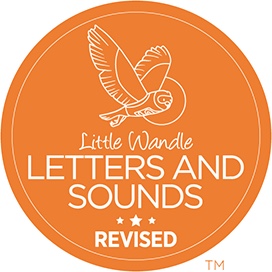Phonics
Phonics at Wheeler
At Wheeler we use the Little Wandle Letters and Sounds Revised Programme to plan and provide daily engaging phonics lessons. Our phonics teaching starts in Nursery and follows a very specific sequence that allows our children to build on their previous phonic knowledge and master specific phonic strategies as they move through school.
How we teach Phonics
When children start in our Nursery class they will be taught Phonics based on the Little Wandle Letters and Sounds Revised ‘Foundations for Phonics’ guidance. The focus is on daily oral blending and language development through high quality stories and rhymes.
In Reception and Y1, children follow the progression within Little Wandle Letters and Sounds Revised programme. Phonics is taught daily and there is a review session on a Friday.
In Y2 phonic lessons are taught daily with this then transitioning into spelling sessions. In Y2-Y6 there are daily planned phonic ‘catch-up’ sessions following a set model to address specific reading/writing gaps. These are short, sharp sessions lasting 20 minutes in length. The children then receive the three reading practice sessions and will bring home their new phonics book weekly.
Reading practice sessions
Children across Reception and Year 1 apply their phonics knowledge by using a fully matched decodable book in a small group reading practice session. These sessions happen three times a week. The sessions follow the model set out in Little Wandle Letters and Sounds Revised. The children then take the same book home the following week to ensure success is shared with the family. In Reception, children will begin sharing a wordless book three times a week then move onto these sessions as soon as they can blend.
How do we assess phonic knowledge?
In Reception and Year 1, at the end of each week there is a review session which recaps the learning. There are also whole review weeks (pre-planned and bespoke review weeks to address gaps identified by the class teacher’s ongoing formative assessment).
Children identified in Reception and Y1 as in danger of falling behind are immediately identified and daily ‘keep up’ sessions are put in place – sessions follow the Little Wandle Letters and Sounds Revised programme. These are conducted in small groups or on a 1-1 basis.
In Reception and Year 1, the children are assessed at the end of every half term using the Little Wandle Letters and Sounds Revised assessment tracker.
The children in Y1 sit the Phonics Screening Check in the Summer Term. Children who do not pass the Phonics Screening Check in Y1, will re-sit this in Y2.
Children who are in Y2-Y6 and need ‘catch up’ sessions are assessed through teacher’s ongoing formative assessment as well as summative assessments every 4 weeks.
Supporting your child with reading
Although your child will be taught to read at school, you can have a huge impact on their reading journey by continuing their practice at home.
There are two types of reading book that your child may bring home:
A reading practice book – This will be at the correct phonic stage for your child. They should be able to read this fluently and independently.
A sharing book – Your child will not be able to read this on their own. This book is for you both to read and enjoy together.
Reading practice book
This book has been carefully matched to your child’s current reading level. If your child is reading it with little help, please don’t worry that it’s too easy – your child needs to develop fluency and confidence in reading and should be reading with at least 90% accuracy.
Listen to them read the book. Remember to give them lots of praise – celebrate their success! If they can’t read a word, help pick out the sounds and blend it together. After they have finished, talk about the book together.

Links to support Phonics at home
Pupils are excited about adding experiences to their ‘Bag for Life’.
Leaders are passionate about preparing pupils to be good citizens for the world beyond Wheeler Primary School
Everyone cares for each other and that every teacher adds a little bit of fun into every lesson
Pupils in key stage 2 talk confidently about a wide range of authors and texts they have read.
There are
opportunities for pupils to attend different clubs and raise funds for charities
The leader’s vision for the school is demonstrated in the way pupils behave
Pupils take books home which contain the sounds that they are learning in class. This gives them plenty of practice.
The teachers are so supportive they help and guide you all the way through the year
The support that leaders provide for families is a strength of the school.
I think the best thing about being a Wheeler pupil is that all of the staff listen and care about you
Classrooms are calm and purposeful places for pupils to learn.
Pupils are encouraged to develop a positive attitude towards themselves and others.
Leaders give pupils the opportunity to complete well-planned and exciting
activities, such as performing in front of an audience, in order to create a ‘bag’ full of life experiences as they progress through the school. .
Throughout my time at Wheeler, I have been given so many opportunities to experience and learn new things
The school has made recent changes to the teaching
of phonics to help pupils get off to the best start with their reading.
It is a safe and happy place to learn.
Pupils are proud to be part of the Wheeler family.
Parents say that the school is ‘fantastic’ and that staff ‘greet the children come hail, rain or shine’ every morning as they arrive.
Pupils report that bullying is rare, but if it happens, staff will sort it out quickly and fairly.
They want pupils to ‘Be Respectful, Responsible and Resilient in Learning and Life’
Leaders have designed and implemented an ambitious and well-planned curriculum.
The staff are really encouraging. They always help us to be the best we can be
The pastoral team works well together to ensure that pupils are safe.
Pupils enjoy coming to Wheeler Primary School every day.
Leaders and teachers have high expectations for every child.
Being at Wheeler is like being part of a family and that makes learning fun
The best thing is having someone to go to when you’re upset


